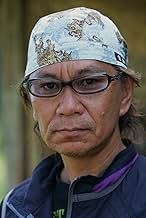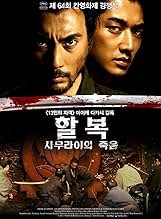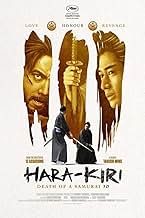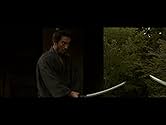IMDb RATING
7.3/10
9.9K
YOUR RATING
A tale of revenge, honor and disgrace, centering on a poverty-stricken samurai who discovers the fate of his ronin son-in-law, setting in motion a tense showdown of vengeance against the hou... Read allA tale of revenge, honor and disgrace, centering on a poverty-stricken samurai who discovers the fate of his ronin son-in-law, setting in motion a tense showdown of vengeance against the house of a feudal lord.A tale of revenge, honor and disgrace, centering on a poverty-stricken samurai who discovers the fate of his ronin son-in-law, setting in motion a tense showdown of vengeance against the house of a feudal lord.
- Director
- Writers
- Stars
- Awards
- 6 nominations total
Eita Nagayama
- Motome Chijiiwa
- (as Eita)
Gorô Daimon
- Priest
- (as Goro Daimon)
- Director
- Writers
- All cast & crew
- Production, box office & more at IMDbPro
Featured reviews
I thought they did a wonderful job with this movie. They didn't sell out by making it all in English with American actors. They didn't go crazy making it a bloodbath just to get the younger viewers. The movie really gives you an insight into Japan's history and what life was like for these people. The atmosphere and story telling really draws you in. The acting is great especially one scene that had me cringing. There were a lot of parts where I was like whoa I didn't see that coming. I can understand those out there loyal to the original but you at least have to give the film makers of this remake credit. They stayed true to Japanese culture, they didn't get tom cruise or Keanu reeves to star in it. They didn't write it for the newer younger audience and make all the characters smart mouth kids. Unfortunately I haven't seen the original yet and I understand how those people might not like this one. I don't know how I would feel about a seven samurai remake? I think this movie was well done. It succeeded in telling a truly gripping story without going all modern on it and ruining it. I enjoyed it.
This is the film about life and how hard it can be. What a true warrior should aim for and what does it mean to be a man of action. Very interesting film with an exceptional rhythm of story telling. At first flow of the film looked too slow for me, but after warming up I did truly enjoy it. As I got very sharp emotional feelings form this very melodramatic remake of Original Harakiri (1962), at the and of the film I've got a special gift, something which will be an interesting suggestion for life and a different angle of view for it.
The Japanese cinema used to be much more powerful in the past. This remake of classic masterpiece Harakiri is far worse in many ways. It toned down criticism of authority, that is the core of the original movie. The central story is overdrawn, and it does not bring much new. What is new in this presentation is almost always at a loss, spare a somewhat simpler structure. Acting is also better in the original. But what is most annoying, is that some key subtle points are missing in this version, almost as if they were not understood, or worse yet, almost if hypocrisy of the authorities is to be whitewashed. It is far less powerful rendering of the story, it lacks authenticity that Kobayashi had with his then contemporary comments. By all means, if you can, see the original first. One of the least justified and worst remakes. However, when the original is so great, this lazy if not outright stupid remake still leaves us with a somewhat shabby but not too bad a movie. It is a disappointment coming from a director that had better days, and especially from a cinematography that seems to have grown tired, and has been surpassed by South Korea but also China to an extent.
Takashi Miike's second straight tribute to the samurai genre is a well-crafted and finely honed object. It's more consistent than Miike's previous samurai film, 13 Assassins, although that also means it lacks anything as great as that film's final battle. But what sets Hara-Kiri apart is its willingness to not just offer a pastiche of these films but genuinely question their values in a way that is still challenging to the contemporary viewer.
Through a series of events told partially in flashbacks, Hara-Kiri poses the question of how relevant our values are -- whether they be highly codified values like honour or the more nebulous instincts that guide us today -- in the face of human suffering. The ronin that we see humiliated and killed in the first act is not guilty of breaking some arcane samurai bylaw but of doing something most of us would find disgraceful. But as the film goes on it argues that we should hold compassion even for people such as this, and that honour is ultimately irrelevant in the face of social suffering. In an age of recession and austerity, where so many try to cling to their ideas of what they or other people "deserve", this is an important message.
It's an easy film to appreciate and a difficult one to love -- there's a kind of coldness to this set of Miike's movies that seems out of place with the gonzo enthusiasm of his earlier work. And doubtlessly it will be too slow and cerebral for some. But its critique of not just a canonized genre but the way in which we view ethics makes it well worth seeing.
Through a series of events told partially in flashbacks, Hara-Kiri poses the question of how relevant our values are -- whether they be highly codified values like honour or the more nebulous instincts that guide us today -- in the face of human suffering. The ronin that we see humiliated and killed in the first act is not guilty of breaking some arcane samurai bylaw but of doing something most of us would find disgraceful. But as the film goes on it argues that we should hold compassion even for people such as this, and that honour is ultimately irrelevant in the face of social suffering. In an age of recession and austerity, where so many try to cling to their ideas of what they or other people "deserve", this is an important message.
It's an easy film to appreciate and a difficult one to love -- there's a kind of coldness to this set of Miike's movies that seems out of place with the gonzo enthusiasm of his earlier work. And doubtlessly it will be too slow and cerebral for some. But its critique of not just a canonized genre but the way in which we view ethics makes it well worth seeing.
Takashi returns to the samurai world after the success of '13 assassins' in 2011. This movie was a remake of 1962 'Harakiri' which was also a massive hit movie. I have not seen the original but this movie blown me away. As usual the story opens slow and hard to identify the situation of the story but at the right middle of the movie the flashback strikes with awesome drama about poverty and family sentiment. Once the flashback was told you will easily say where the movie is heading. The story was classic and the movie was presented with rich cinematography. The first digital 3D movie for Takashi Miike as well the first 3D movie to premier at 2011 Cannes film festival.
You have to learn a word to understand the movie completely. 'Seppuku' - which means ritual suicide committed by a samurai. So that is why it's called 'Hara-kiri: death of a samurai'. You must have patience during opening sequences, without character and story development you will be in a tough position to understand about what's going on. While the story and character progress with the development you will start to get and you may fall for the emotion parts if you are a tenderhearted. And also you will be uncomfortable during 'seppuku' scene.
Takashi Miike's career best, this is what already everyone saying about it. But Its to hard to say which was his best, I like many of his works. I might be overwhelmed by the watch but will be happy to recommend it to others. I was very little unhappy for the ending scene otherwise I could have said it is the best of Takashi's work.
I am so curious about Takashi Miike's upcoming and Hollywood debutante project 'The outside' with Tom Hardy. Expecting it would be another 'The last samurai', I wish a good luck to the team.
You have to learn a word to understand the movie completely. 'Seppuku' - which means ritual suicide committed by a samurai. So that is why it's called 'Hara-kiri: death of a samurai'. You must have patience during opening sequences, without character and story development you will be in a tough position to understand about what's going on. While the story and character progress with the development you will start to get and you may fall for the emotion parts if you are a tenderhearted. And also you will be uncomfortable during 'seppuku' scene.
Takashi Miike's career best, this is what already everyone saying about it. But Its to hard to say which was his best, I like many of his works. I might be overwhelmed by the watch but will be happy to recommend it to others. I was very little unhappy for the ending scene otherwise I could have said it is the best of Takashi's work.
I am so curious about Takashi Miike's upcoming and Hollywood debutante project 'The outside' with Tom Hardy. Expecting it would be another 'The last samurai', I wish a good luck to the team.
Did you know
- TriviaThe first 3D title ever to be shown in official selection at the Cannes Film Festival.
- GoofsAs the wooden wakizashi is pushed into the stomach (after the tip snapped off), you can see that the blade is sliding into the handle.
- Quotes
Hanshirô Tsugumo: A warrior's honor is not something simply worn for show!
- ConnectionsFeatured in At the Movies: Cannes Film Festival 2011 (2011)
- How long is Hara-Kiri: Death of a Samurai?Powered by Alexa
Details
- Release date
- Countries of origin
- Official sites
- Language
- Also known as
- Cái Chết Của Võ Sĩ Đạo
- Production companies
- See more company credits at IMDbPro
Box office
- Gross US & Canada
- $75,688
- Opening weekend US & Canada
- $10,920
- Jul 22, 2012
- Gross worldwide
- $5,435,358
- Runtime
- 2h 8m(128 min)
- Color
- Sound mix
- Aspect ratio
- 2.35 : 1
Contribute to this page
Suggest an edit or add missing content
































